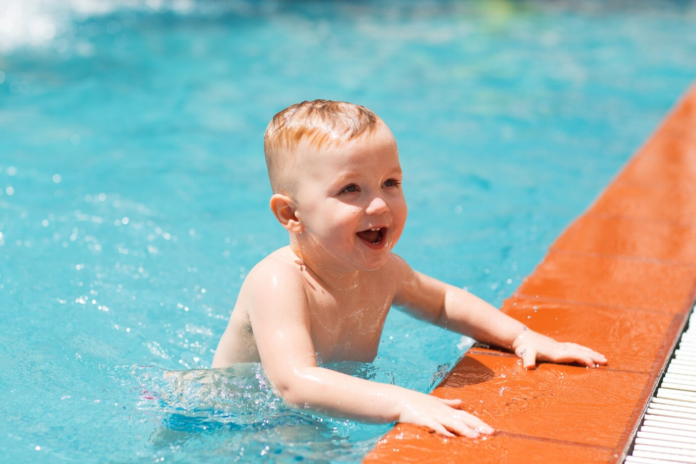Does your kid also enjoy playing with water? Have they ever watched your baby mesmerized by the bathtub or splashing happily in a kiddie pool? Kids love playing in the water, whether they’re learning to swim or just having fun splashing around. Do you ever think when can babies learn to swim?
Well, the answer, like most things with parenthood, isn’t a simple one. It depends on various factors, including your baby’s developmental stage, comfort level in water, and access to qualified instructors. Learning to swim is really important because it helps keep your child safe as they grow up.
This blog will dive into the wonderful world of when can babies learn to swim, infant swimming, exploring the benefits, appropriate ages to start, and tips for a positive experience.
When can you take your kid to swimming?
Learning to swim has no set age requirement. But there are some activities which kids can do at different ages. So that kid gets used to water interaction.
Here’s a breakdown of how babies typically experience water at different ages:
-
Newborn to 6 Months
Babies love to feel cozy and safe, especially during bath time. When they’re brand new, having them close to your skin in a warm bath can make them feel calm and secure. As they grow a bit, you can try something called “tummy time” on a waterproof mat near the water. This helps them get used to the feeling of being close to water and can be a fun new experience for them.
-
6 Months to 1 Year
This is a perfect time to help your baby get used to being in the water. You can check out classes where parents join in, too, all about making water time enjoyable and cozy. In these classes, you’ll find lots of playful activities like blowing bubbles, singing songs, and gentle splashing. These fun activities can help your little one feel more comfortable in the water and start to enjoy being there.
-
1 Year and Up
As your child grows and becomes more self-assured, they can begin to learn some simple swimming moves, like kicking their legs and getting their face wet. This is when it might be a good idea to think about formal swimming lessons with a teacher who knows their stuff. These lessons can be a great way for your child to build on what they already know and become even more confident in the water.
Factors to Consider Before Starting Swim Lessons
Introducing your little one to water at an early age can be really great, but there are some important things you should think about before signing them up for swim lessons. It’s important to take your time and make sure everything is set up in the best way for your baby’s safety and enjoyment:
-
Your Baby’s Comfort Level
The biggest thing to pay attention to is how your baby feels in the water. If they start crying or seem really upset, it’s a sign that they might not be ready yet. In that case, it’s a good idea to wait and give it another try when they feel more comfortable and relaxed.
-
Developmental Milestones
Before getting your kid into swimming, discuss your baby’s development with your pediatrician. Generally, babies who can sit up unsupported and have good head and neck control are good swimmers.
-
Quality of Instruction
Always make sure you are choosing an expert to train your kid. Look for qualified instructors with experience teaching young children. Before enrolling your child, look at a few things, such as the number of students in a batch. The smaller the number, the more attention your kid gets from the trainer. So, before enrolling, check these things for better learning.
Benefits of Early Water Introduction
There are lots of good things about getting your baby used to water, even before you start proper swimming lessons. Here are some important benefits you might want to know about:
Builds Confidence
This kind of skill builds confidence in your kid. Positive experiences in the water can help your baby feel comfortable and confident around water bodies. This can be a valuable life skill.
Early Motor Development
When babies play in the water, they have a special chance to learn how to move their bodies. For example, kicking their legs and splashing with their arms can help make their muscles stronger and help them get better at moving around.
Bonding Time
Taking swim classes together with your baby is a wonderful chance to make special memories and make your bond even stronger. It’s a time when you can have lots of fun together in the water and build a closer connection with your little one.
Lifelong Love for Swimming
Having fun in the water when you’re young can make you really like swimming for the rest of your life. It’s a great way to have fun and stay healthy, and when you start enjoying it early on, it can stick with you for a long time.
Safety comes first. When your baby is going swimming, there are some precautions you need to take for a safe swimming lesson.
Precautions – Essential Tips for Bringing Your Baby Swimming
- Never leave your baby unattended in the water, not even for a second.
- Always maintain constant physical contact with your baby.
- Use a properly fitted life jacket for younger babies who are not yet learning to swim independently.
- Make sure the pool or swimming area is clean and well-maintained.
- Apply sunscreen (SPF 30 or higher) to your baby’s exposed skin for at least 15 minutes before swimming.
- Be aware of the signs of cold, stress, and overheating in your baby.
The Final Note
In the end, hope you will get the answer to when can babies learn to swim. The journey of introducing your baby to swimming is a rewarding one, filled with numerous benefits and considerations.
Understanding when babies can start to swim involves recognizing their developmental stages, comfort levels in water, and the guidance of qualified instructors. Starting from the cozy moments of bath time to the playful splashes in kiddie pools, each stage contributes to fostering a lifelong appreciation for swimming.
Through bonding experiences in swim classes and the development of early motor skills, babies can gain confidence and a love for swimming from an early age.
However, safety remains paramount throughout this journey, with precautions such as constant supervision, proper fitting of life jackets, and awareness of environmental factors. By prioritizing safety and considering the unique needs of each child, parents can create a positive and enriching swimming experience for their little ones, laying the foundation for a lifetime of enjoyment and safety in the water.
So, when can babies learn to swim? It’s a gradual process, beginning with water exploration in infancy and progressing with careful guidance, ensuring both joy and safety along the way.




